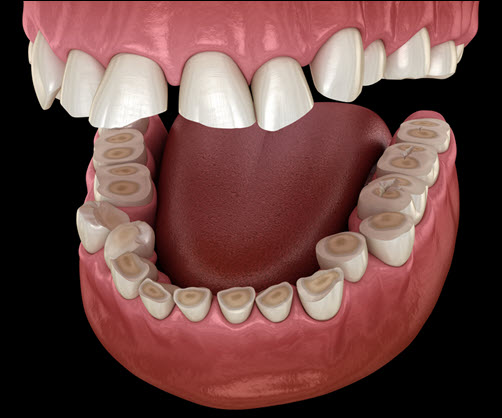Bruxism and Restoring Damaged Teeth for a Healthy Smile
Bruxism, or teeth grinding, damages teeth and strains jaw muscles. It usually happens during sleep but also occurs during stress. Grinding wears down enamel, increases sensitivity, and causes jaw pain. Untreated bruxism leads to fractures, tooth misalignment, and gum recession. Stress, misaligned teeth, and sleep disorders increase bruxism risk. Restoring damaged teeth improves bite strength and smile appearance. Night guards, crowns, and dental bonding protect and repair worn teeth. Managing bruxism early prevents long-term dental complications. Understanding the causes and treatments for bruxism ensures a healthier smile. Let’s explore how to stop grinding and restore damaged teeth.
What Causes Bruxism?
Stress and anxiety are leading causes of bruxism. When stressed, the body tenses jaw muscles, leading to grinding during sleep. Misaligned teeth increase uneven pressure, triggering grinding. Sleep disorders like sleep apnea and snoring increase muscle activity and grinding. Caffeine and alcohol consumption increase jaw tension and grinding frequency. Certain medications, including antidepressants, list bruxism as a side effect. Poor sleep quality increases jaw clenching and muscle strain. Teeth grinding also results from an abnormal bite or missing teeth. Identifying the cause helps dentists target treatment effectively. Managing stress and improving bite alignment reduces grinding and improves comfort.
Effects of Bruxism on Teeth and Jaw
Chronic grinding wears down enamel, increasing sensitivity and cavity risk. Worn enamel exposes the dentin layer, making teeth more sensitive to hot and cold foods. Grinding creates small cracks in teeth, increasing the risk of fractures and breakage. Over time, grinding weakens tooth structure, leading to loose teeth and misalignment. Jaw muscles become overworked, causing soreness, headaches, and jaw stiffness. Bruxism also strains the temporomandibular joint (TMJ), leading to clicking, popping, and limited jaw movement. Untreated bruxism worsens bite alignment and increases tooth loss risk. Treating bruxism early strengthens enamel and protects jaw health. Stronger teeth and better alignment improve comfort and chewing efficiency.
How to Prevent Bruxism
 Wearing a custom night guard protects teeth from grinding pressure. Night guards cushion the teeth and reduce strain on the jaw joint. Relaxation techniques like deep breathing, yoga, and meditation reduce stress and muscle tension. Reducing caffeine and alcohol intake lowers muscle activity and grinding frequency. Orthodontic treatment corrects misalignment and reduces uneven pressure. Physical therapy strengthens jaw muscles and improves joint flexibility. Mouth exercises increase jaw control and reduce muscle strain. Proper sleep hygiene improves muscle relaxation and reduces grinding episodes. Better stress management and alignment reduce the impact of bruxism. Preventing grinding protects enamel and strengthens teeth.
Wearing a custom night guard protects teeth from grinding pressure. Night guards cushion the teeth and reduce strain on the jaw joint. Relaxation techniques like deep breathing, yoga, and meditation reduce stress and muscle tension. Reducing caffeine and alcohol intake lowers muscle activity and grinding frequency. Orthodontic treatment corrects misalignment and reduces uneven pressure. Physical therapy strengthens jaw muscles and improves joint flexibility. Mouth exercises increase jaw control and reduce muscle strain. Proper sleep hygiene improves muscle relaxation and reduces grinding episodes. Better stress management and alignment reduce the impact of bruxism. Preventing grinding protects enamel and strengthens teeth.
Restoring Damaged Teeth with Dental Crowns
Dental crowns restore teeth weakened by bruxism. Dentists prepare the damaged tooth by reshaping it to hold the crown. The crown fits over the tooth, protecting it from further damage. Porcelain and ceramic crowns match natural tooth color for a seamless look. Metal crowns provide extra strength for molars and back teeth. Crowns improve bite alignment and chewing strength. The secure fit prevents cracks and enamel wear from worsening. Crowns also improve tooth shape and size, creating a more balanced smile. Stronger crown support reduces sensitivity and increases overall comfort. Crowns restore natural tooth function and improve smile appearance.
Repairing Worn Teeth with Dental Bonding
Dental bonding repairs small chips and worn edges caused by grinding. Dentists apply a tooth-colored resin to the damaged area. The resin bonds to the tooth surface and hardens under a special light. Bonding fills small cracks and protects exposed dentin. It also reshapes worn teeth and improves bite balance. The procedure is quick, painless, and provides immediate results. Bonded teeth resist further wear and improve overall appearance. Bonding reduces sensitivity and protects enamel from future damage. Proper care extends the lifespan of bonded teeth. Stronger teeth improve smile symmetry and chewing efficiency. Bonding creates a natural, polished look.
Strengthening Teeth with Dental Veneers
Dental veneers cover and protect teeth damaged by bruxism. Veneers are thin porcelain or composite shells bonded to the front of teeth. They cover enamel damage, discoloration, and uneven edges. Veneers resist staining and improve tooth strength. The dentist reshapes the tooth slightly before applying the veneer. Once bonded, veneers strengthen enamel and improve smile symmetry. Veneers improve bite balance and reduce sensitivity from exposed dentin. Proper care increases veneer lifespan and maintains tooth strength. Veneers create a natural, balanced smile and improve overall appearance. Stronger teeth increase chewing comfort and improve long-term dental health.
Long-Term Protection and Care
Wearing a night guard protects restored teeth from grinding damage. Regular dental checkups detect early signs of enamel wear and tooth strain. Brushing and flossing daily prevent plaque buildup and protect tooth surfaces. Avoiding hard foods and chewing gum reduces jaw strain and pressure on teeth. Reducing stress through relaxation techniques prevents muscle tension and grinding episodes. Orthodontic care improves bite alignment and reduces uneven pressure. Strengthening enamel with fluoride toothpaste increases tooth resistance to grinding. Consistent care and protection extend the lifespan of dental repairs. Stronger teeth improve bite strength and overall dental health.
Bruxism damages enamel, weakens teeth, and strains jaw muscles. Stress, misalignment, and poor sleep increase grinding frequency. Wearing a night guard and reducing stress prevent further enamel wear and tooth strain. Dental crowns, bonding, and veneers restore damaged teeth and improve smile strength. Early treatment improves bite alignment and reduces sensitivity. Strengthening enamel and protecting teeth with proper care increase dental comfort. Investing in professional care ensures long-term smile health and strength. Proper dental care protects against future grinding and improves tooth stability. Stronger teeth and a balanced bite create a healthier, more confident smile.

